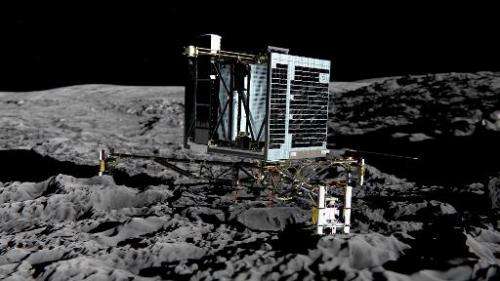Relief as signal arrives from comet lander

Europe's Rosetta spacecraft made contact with its robot craft Philae soon after the lander embarked Wednesday on a solo, seven-hour descent to a comet, ground controllers said. (WATCH LIVE)
"Rosetta is receiving a signal from Philae," mission operations department head Paolo Ferri said at the European Space Agency (ESA) control centre in Darmstadt, Germany.
"It's a very important moment."
Communications were re-established on schedule more than two hours after Philae set off at 0835 GMT for a 20-kilometre (12-mile) descent from the Rosetta orbiter, its home for the last decade.
"Phew! Back in contact with Earth after separation," said an ESA Rosetta Mission tweet, followed shortly thereafter by the update: "Also now back in contact with @philae2014! Good to hear you again buddy :)"
Philae was placed on a trajectory Wednesday towards 67P/Churyumov-Gerasimenko, a comet now more than 510 million kilometres (320 million miles) from Earth and racing towards the Sun at 18 kilometres per second (11 miles per second).
The fridge-sized robot lab, carrying 10 scientific instruments, will attempt to land at about 1530 GMT, with a confirmation signal expected on Earth about half an hour later.
"Finally! I'm stretching my legs after more than 10 years. Landing gear deployed!" was the tweet from the special ESA Operations hashtag #CometLanding around lunchtime Wednesday.
With Philae riding piggyback, Rosetta was launched in 2004 for a 6.5-billion-kilometre (four-billion-mile) space trek that saw it enter the comet's orbit in August this year.
Astrophysicists hope Philae will unlock knowledge about the origins of the Solar System and even life on Earth, which some believe may have started with comets "seeding" the planet with life-giving carbon molecules and water.
© 2014 AFP





















